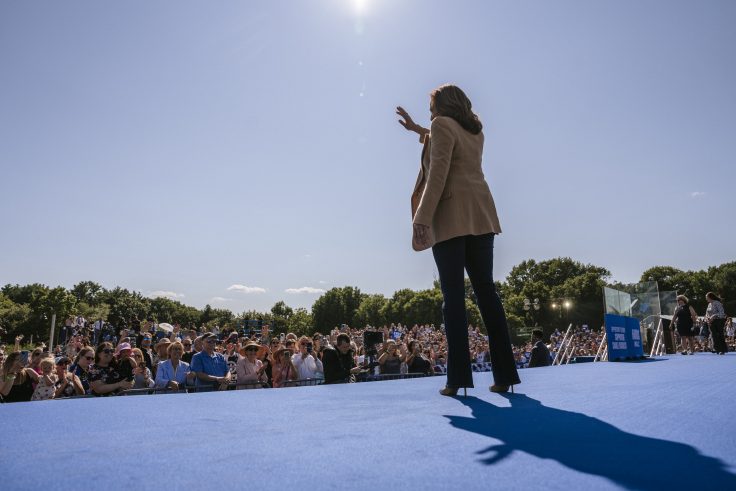Column: How Kamala Harris weaponized vagueness

What's Kamala Harris's secret? In mid-June, she was a political liability for Joe Biden. Now, she's running neck-and-neck with Donald Trump. In July, Harris was less popular than either Biden or Trump. Now, she's more popular than both of them. In July, Harris was an awkward but loyal soldier in a doddering administration. Now, we're told that she's a cultural phenomenon. The next Obama. She's "brat"—whatever that means.
Harris's new status isn't due to her policy proposals. She hardly has any. Her public speeches are fine, but she's no Cicero. Oratory isn't her strength. Nor has she become more popular because she's often in the public eye. On the contrary: Harris has limited her campaign appearances. She hasn't had an official press conference or a solo interview since Biden dropped out. There's something guarded about Harris, a part of herself that she's reluctant or unwilling to reveal. Many voters like her anyway.
Harris has benefited from adulatory media, for sure. According to the Media Research Center, she received 84 percent positive coverage in her first month as a candidate, a far cry from Trump's 89 percent negative coverage during the same period. She faced few tough questions, and even fewer follow-ups, during her joint interview with running mate Tim Walz on CNN last week. The Trump campaign has found it difficult to cut through the thicket of stories that celebrate Harris's joy and vibes, her passion for cooking, and her adoring fans.
Worshipful press coverage doesn't fully explain the reversal of Harris's fortunes. A politician's favorability usually trends in one direction: downward. There are times when events cause an elected official's or a candidate's popularity to spike, such as the public rallying behind President George W. Bush after 9/11 or John Kerry riding pro-veteran sentiment to win the 2004 Democratic primary. But the sweet feelings eventually turn sour.
This makes Harris unique. Her reputation has crashed and burned not once but twice—after her 2019 presidential campaign debacle, then after her 2021 interview with NBC's Lester Holt—only to respawn for reasons out of her control. The word for that is luck.
My theory is Democrats and Democrat-leaning independents were so happy to see Joe Biden off the ticket that they would have fallen in line behind anyone. Harris was savvy—and well-placed—to lock up the nomination before rivals entered the ring. She's been riding a wave of positive energy since July that has boosted her favorability, upped her game, and deluged her with fundraising. The energy is psychic: relief and excitement that Democrats have a chance to keep Trump from returning to the White House. The surprise, unbidden possibility of victory endowed Harris with a mystique. She's made the most of it, but the effect may be starting to fade.
The Harris mystique depends on ignorance of her past. Most Americans don't know or care who the vice president is—a June YouGov poll found that just 33 percent of Americans knew the Democrats had announced Biden's running mate. As a consequence, Harris had an opportunity to refashion herself for the 2024 electorate. She presented herself as warm, friendly, and nonthreatening while aides revised history. They convinced friendly reporters that no, Biden hadn't put her in charge of the border crisis in the spring of 2021. They told reporters that Harris had abandoned positions such as decriminalizing illegal immigration, banning fracking, gun buybacks, and eliminating plastic straws. Presto: The second-most liberal senator in the 21st century became Mamala. The left-wing governor of Minnesota became Coach Walz.
The Harris mystique also shields the candidate from easy definition. Her campaign appropriates GOP symbols, tropes, and rhetoric to such an extent that, if you ignore the blue hair in the crowd, it can be hard to distinguish Harris rallies from Romney rallies 12 years ago. Her speech Wednesday in North Hampton, N.H., was a case in point. Audience members held up signs reading "Opportunity Economy" and "A New Way Forward." Harris praised freedom, patriotism, small business, and the Constitution. She attacked Trump's tariffs as "in effect a national sales tax." Listening to Harris extol the virtues of enterprise, you'd have no idea that she cast the deciding vote on the spending splurge that drove historic inflation, that her administration has imposed almost $1.4 trillion in regulations, that she wants to weaken right-to-work laws, and that she wants Congress to pass $5 trillion of new taxes over 10 years.
In New Hampshire, Harris touted a hike in the capital gains tax rate to 28 percent from 23.8 percent. She didn't mention that her tax plan also includes a surcharge on millionaires of 5 percent, bringing the top rate to 33 percent. That's a nearly 40 percent increase, yet Harris's speech was treated by the press as a sign of pro-business moderation. Plus, Harris hasn't spelled out her position on taxing unrealized capital gains—assets that have increased in price but haven't been sold. Meaning you'd have to use cash to pay the tax bill for changes in the value of paper assets. Which is insane.
Reparations for slavery? Harris is coy. Universal Basic Income? She's demure. Abolishing private health insurance? The Harris whisperers say she's no longer interested. But she hasn't said so herself. And Dana Bash didn't ask her about the neo-socialist Medicare for All on CNN. The Harris mystique was too powerful.
Powerful, at least, among Democrats and the press. There are signs the voting public may be developing some immunity to Harris's obfuscations. She's made progress, but the race is a tossup. The polls are too close to draw firm conclusions. Each policy rollout raises more questions. The Sept. 10 debate with Trump looms. He could use the moment to dispel the Harris mystique by defining her as a lefty weakling unsuited to lead the United States. A blown opportunity would allow Harris's campaign of concealment, misdirection, amnesia, and euphemism to continue through Election Day—and into the White House.


No comments:
Post a Comment